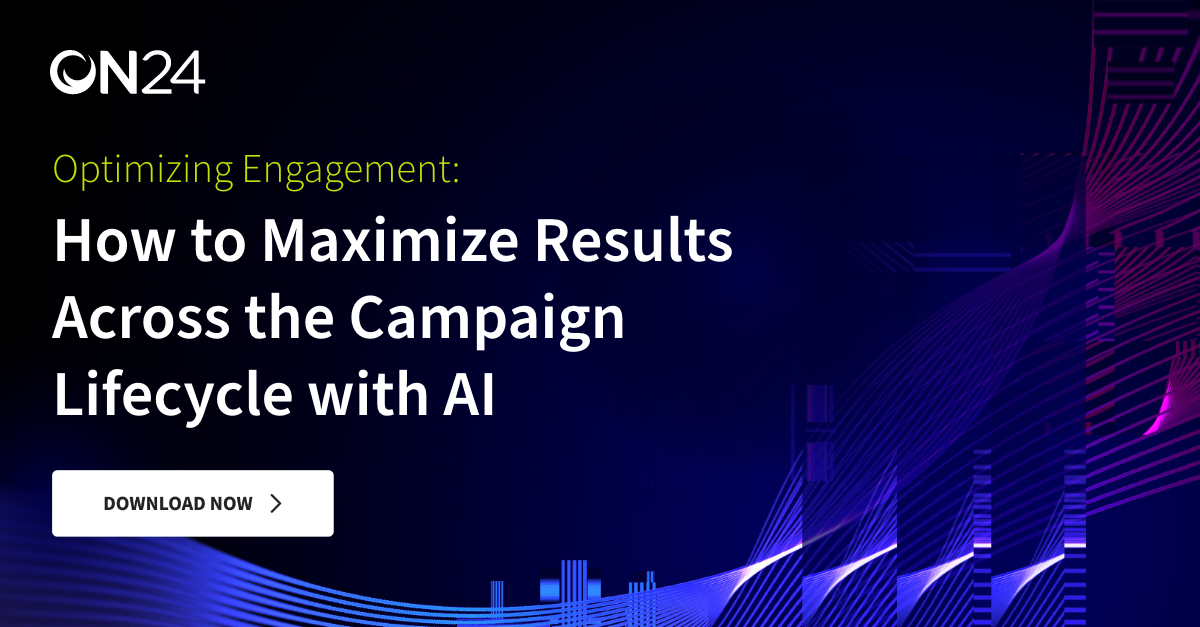Artificial intelligence is quickly becoming an invaluable resource for marketers working in B2B organizations. The range of tasks AI can assist with, from audience segmentation to data analysis, is growing almost daily. But how can a busy marketer get the most out of the power of AI in their programs?
We’ve put together the following guide to help you get started, covering what role AI can play in B2B marketing campaigns, what benefits it offers and how to use it for maximum impact.
What is the role of AI in B2B marketing?

AI is transforming how B2B marketers conduct key marketing functions while introducing new opportunities.
That’s because AI, as a technology, is fairly versatile and can be applied at various stages throughout the marketing process. By implementing AI, you can improve both the effectiveness and efficiency of:
-
- Audience segmentation
- Content creation
- Lead nurturing
- Data analysis
Not to mention marketing campaigns in general.
What are the benefits of AI in B2B marketing?

AI technology can offer many benefits for B2B companies — especially those looking to boost marketing results. More specifically, here are four of the most compelling reasons to integrate AI in the B2B marketing process:
Enhanced lead generation
AI can positively impact B2B lead generation by helping marketers create and deploy more effective campaigns. There are various ways to integrate AI in lead generation campaigns, including optimizations in audience segmentation, content creation, personalization and data analysis processes.
Personalization at scale
Personalization in B2B marketing can drive significantly improved results, and AI can help make it easier to roll out at scale. Of particular note is AI’s ability to generate diverse personalized marketing messages and content tailored to suit different audience segments, which can drive higher engagement and conversion rates.
Data-driven decision-making
AI-powered analytics tools can deliver critical, actionable marketing insights automatically, helping teams quickly improve campaign performance. Integrating AI into the marketing analysis or reporting process allows B2B marketers to make data-driven decisions that more reliably boost marketing results.
Scale content creation
Creating effective B2B marketing content at scale takes a lot of resources, which can limit marketers’ ambitions and hold them back from achieving outstanding results. AI is perfectly suited to solving this problem, making it easier than ever to ideate and produce vast amounts of marketing content.
This includes blog posts, white papers, social media posts, newsletters, and more, all of which can be used in impactful multichannel campaigns. Certain AI tools, like the ON24 platform’s AI-powered Analytics and Content Engine, can also adapt existing marketing resources, like webinars, into other mediums.
How B2B marketers can use AI

There are countless ways AI in marketing can strengthen B2B campaigns. These are some of the most powerful:
Deliver personalized content
Audiences aren’t homogenous – they comprise many distinct groups and segments. Marketing personalization is all about targeting those groups with content tailored to suit their specific demographics, interests or behaviors.
AI can help to make this task more manageable at scale by assisting in the audience segmentation and content creation processes.
With the AI-powered ACE, a feature of the ON24 Intelligent Engagement Platform, users can quickly identify audience segments and target them with personalized content marketing experiences powered by generative AI.
Use Predictive Analytics for Sales and Marketing
Sophisticated predictive analytics can help marketers make better, data-driven decisions that increase marketing ROI. B2B marketers can use AI to improve the accuracy and convenience of their predictive analytics process, meaning they can get more value from their marketing data.
There are various ways to integrate AI in predictive analytics, including forecasting customer behavior, automatically scoring leads based on pre-defined criteria, or optimizing sales processes to suit unfolding trends in your target audience’s sectors.
Enhance Customer Experience with AI Chatbots
High standards of customer service can help maximize customer experience, which in turn can improve customer loyalty and lifetime value. But with B2B demand often coming from across the globe, providing comprehensive, always-on customer service can be costly.
AI chatbots provide an alternative to building out a huge customer service team, providing a highly knowledgeable contact point available 24/7, no matter where your audience is. Even if you prefer to keep your support human-led, AI-powered chatbots are great at screening inquiries.
Improved customer retention
B2B marketers can also use AI technology to improve their customer retention strategy, allowing them to maximize customer lifetime value and, by extension, marketing revenue.
There are various ways that AI can boost retention, including by powering personalization in customer communications, enabling always-on customer support, and delivering predictive analytics to inform program optimizations.
The Future of B2B Marketing with AI
Although it’s already had a huge impact on B2B marketing, AI is still a relatively new technology. And it will only improve, with the future likely to bring new AI B2B marketing trends.
Emerging AI Technologies
AI’s use cases in B2B marketing are currently mainly driven by generalized chatbots like ChatGPT and dedicated AI-powered marketing tools like ON24. But, just like any other technology, AI will continue developing.
That means there are plenty of new B2B marketing applications to come, which will leverage AI’s versatility to support B2B marketers in even more ways. Some of these applications, such as AI-powered voice search and customer support bots, are already emerging.
Hyper-personalization
Marketing hyper-personalization is marketing personalization taken to the extreme. Whereas the former group’s audience members into segments based on shared traits, hyper-personalization involves treating each customer as their segment.
We expect that, in time, AI will make hyper-personalization in B2B marketing much easier to implement, enabling marketers to deliver highly individualized content experiences that significantly boost engagement and conversion rates.
AI-enhanced customer journeys
AI can also help optimize the customer journey, allowing businesses to nurture leads more effectively and efficiently. This could involve using AI to automate marketing touchpoints, ensuring that potential customers are kept engaged from the point of their first impression.
For example, an AI tool with access to a library of B2B marketing content could automatically deliver specific pieces to new leads as and when they become relevant to their needs, guiding them down the marketing funnel toward conversion.
Transform your business landscape with AI B2B marketing

We’re still in the early days of AI’s development cycle, but it’s already clear it can be a truly transformative force in B2B marketing. The capacity it has to improve the effectiveness and efficiency of marketing campaigns means it’s an unmissable opportunity for companies seeking new ways to acquire customers.
To avoid missing out, consider how you can take your first steps towards an AI-assisted B2B marketing strategy today by contacting us to learn more about what ON24 can do for you.


